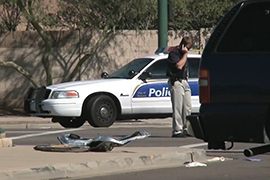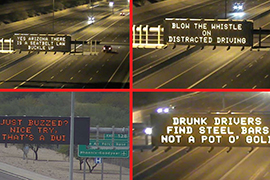- Slug: BC-CNS-Highway Deaths,500
- Graphic available (embed code below)
- Photos, video story available (thumbnails, captions below)
By TYLER FINGERT
Cronkite News
WASHINGTON – Highway fatalities in Arizona rose from just over two per day in 2014 to an average of more than 2.6 per day last year, the highest level in nine years, according to the most recent estimates.
The 2016 numbers capped a steady three-year rise in traffic fatalities after several years of fluctuations, according to estimates from the National Safety Council. The state’s rise in fatalities mirrored the increase over the same three-year period in the U.S., which also hit motor vehicle death numbers not seen since 2007.
The safety council said the 950 people killed in crashes throughout Arizona in 2016 represented a 23.7 percent increase from the 768 who were killed just two years earlier.
“Unfortunately, the news is not good in Arizona,” said Kelly Nantel, vice president of communications and advocacy at the safety council. “In the national average we went up about 6 percent in fatal crashes in 2016, in Arizona, that number is 8 percent (from 2015).”
Nationwide, the safety council estimates that 40,200 people lost their lives on roads in the United States, up from 35,398 in 2014.
“This is a terrible trajectory for our country,” Nantel said. “There are a lot of things we can do, all of us individually and collectively to help drive down those numbers.”
Low gasoline prices and an improving economy boosted the total number of miles driven on U.S. roads last year to more than 3.2 trillion miles, the fifth straight year of increases, according to the Federal Highway Administration. But that 3 percent increase in driving last year is only half the 6 percent increase in fatalities last year.
A safety council survey that was released with the fatality estimates found that while most people consider highway safety important, two-thirds said they were comfortable speeding and almost half said they texted – manually or hands-free – behind the wheel.
Another 13 percent said they had driven after using marijuana, 10 percent said they drove even after they felt their ability to do so “had been compromised” by drinking and 64 percent said they felt it was safe to drive after taking opioid pain medication. The survey of 2,001 people was taken from late January to early February.
All those are risk factors that can be controlled, said Jessica Cicchino, vice president for research at the Insurance Institute for Highway Safety.
“If states cracked down on some of the reasons that we see for the most number of fatalities, things like impaired driving or speeding … we really could see this number come down a lot,” Cicchino said.
The Arizona Department of Transportation is putting the issue in front of drivers with creative freeway signs that highlight the problem while being clever enough to grab drivers’ attention.
But safety advocates say more needs to be done.
“I don’t think any of us will ever be satisfied until we reach zero deaths on our roadways,” Nantel said. “We can do and we must do much better. ”
^__=
Web links:
_ NSC fatality estimates: http://www.nsc.org/NewsDocuments/2017/12-month-estimates.pdf
_ NSC survey: http://www.nsc.org/NewsDocuments/2017/Driver-Safety-Poll.pdf
_ AzDOT Facebook page: https://www.facebook.com/AZDOT/
_ Graphic embed code: <script id=”infogram_0_traffic_deaths-25″ title=”Traffic Deaths” src=”//e.infogr.am/js/dist/embed.js?xC2″ type=”text/javascript”></script>
^__=
The number of highway fatalities rose steadily in Arizona and the U.S. for the last three years, according to estimates from the National Safety Council, climbing to the highest levels in nine years. (Photo by Cronkite News)
One way to get the highway safety message across is to get the message across the highway, as the Arizona Department of Transportation does with its catchy message boards. (Photos courtesy Arizona Department of Transportation)

